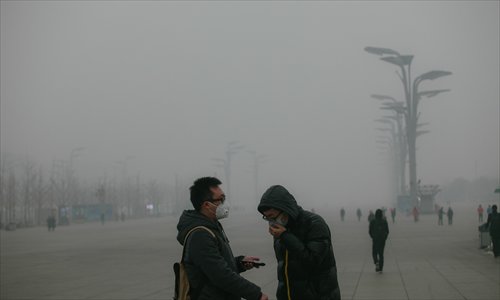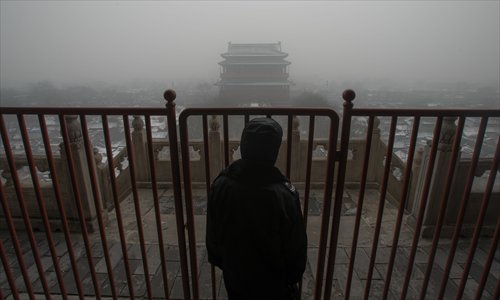Smog induced anxiety
Beijing’s polluted air taking a mental toll on residents

Experts warn residents not to be too passive, but avoid overreacting. Photo: Li Hao/GT
On smoggy days, Pang Jing, a 31-year-old woman in Beijing, does not leave home without at least three different pollution masks. One is a rather expensive professional respirator for outdoor activity, another has four layers containing activated carbon and is for indoor public places, such as subway stations and supermarkets, and, the third, a brand new individually packaged N95 respiratory mask, is extra - just in case, she said.
"I have spent more money on anti-smog protection equipment than on cosmetics and new clothes this year," said Pang.
She spent more than 5,000 yuan ($773.5) on masks and filters, and more than 10,000 yuan on a top-shelf air-purifier. She said it was only after she purchased the items that she could feel "protected and reassured."
Pang said on smoggy days she feels muddled and becomes "lost in illusions"regardless of where she is. She cannot help thinking about the numerous dirty particles she breathes in.
"Every time I think about it, my throat begins to feel scratchy, and I get a foreign body sensation, especially on the way to work in the mornings," said Pang. "I cannot help worrying about my health, and often randomly think about my miserable life in Beijing. It seems that all these negative emotions would hit me at the same time."
After Beijing issued its first red alert for air pollution on December 8, people's concerns about Beijing's air quality raised to a record-high, and a lot of them are getting anxious about the pollution. According to Luo Xiaonian, a psychiatrist at Beijing Anding Hospital, Beijing's smog can make people feel upset, anxious, or depressive, and can also trigger psychological problems if not caught and treated in time.

Air pollution can cause psychological problems such as anxiety, depression and even lead to suicide. Photo: Li Hao/GT
Unhappy & helpless
According to a December 9 China Business Network report, the sale of health products and air quality related equipment in China skyrocketed in the second week of December. The sale of air purifiers increased by 208 percent and masks by 42 percent over the previous week.
Pang is one of the contributors to the sharp increase. She is constantly changing the filters for her respirator. "I change the filter every day. If I go outside without a mask or with a mask but forget to change the filter, I become very flustered and annoyed like I lost my phone," said Pang. "I am easily scared whenever I think about the pollution or read any news about the harmful effects of pollution."
Pang is not alone. An increasing number of people have been experiencing panic attacks due to the high level of pollution, and online chatter and rumors make them even more fearful.
A photo shot from inside a plane titled "the layer of smog over Beijing" gained massive attention on Sina Weibo and was forwarded more than 10,000 times. In the image, thick black clouds cover the sky like a big, thick, dirty blanket. It created quite a stir.
"I am so scared to see the thick smog layer over our heads. I'd rather die right now than be slowly tortured to death by the pollution," a Sina Weibo user named "Lanlanlu" said.
The China Meteorological Administration later discredited the image on its official Weibo account, saying that the photo was a low exposure image of normal clouds and the black color was just because of the light.
Research done in 2013 by Mak Arvin and Byron Lew at Trent University in Canada has drawn a link between air pollution and people's unhappiness.
The university tested the air quality in 14 European countries and compared them with surveys of their residents' feelings of happiness. They found that the level of happiness of the residents changed with the quality of the air. The worse the pollution was, the less happy the residents were.
Wang Keyou, a 22-year-old courier working at STO Express, told Metropolitan that he feels helpless on smoggy days.
Wang spends most of his workday outdoors and counts himself among the most vulnerable people in the city. He has to deliver over 100 packages per day, regardless of whether it is rainy, windy or smoggy. When he came to Beijing from Hunan Province last year, he did not realize how serious the problem was. Now, he is more aware of the dangers of the pollution but can do very little to minimize the risks.
"I can only afford to buy the simplest mask, and I have no money for an air purifier. I have to work even in smog," said Wang.
Wang's parents worry about his health. They have asked him to return home, but he refused. He said he can make more money in Beijing, but the helplessness triggered by his failure to effectively protect himself on smoggy days makes him feel sad and upset.
"When it is smoggy, I am easily homesick, irritable, and likely to receive more complaints from my customers. I even cried once, secretly," said Wang.
More than just depression
People are more mentally vulnerable on smoggy days, Luo said. He said while smog makes it easier to have psychological and emotional fluctuations, the reasons for such responses are varied and complicated.
"Smog is harmful, and can cause many physical problems, such as diseases of the respiratory system, heart, and cerebral vessels, which are all related to immune imbalance," said Luo. "Immune imbalance is one of the most important causes of depression and anxiety."
Smoggy days can also increase the suicide rate. According to a 2010 report published in the American Journal of Psychiatry, research fellows led by Kim Chang-soo of Yonsei University in Seoul studied more than 4,000 suicide cases and found that more people took their own lives in the two days following a pollution spike. During smoggy days, healthy people were about nine percent more likely to kill themselves than in clear days while people with heart diseases were almost 19 percent higher than in clear days, said the report.
Kim also suggested that air pollution may also cause nerve inflammation, which affects mental health through a direct biological mechanism.
Luo said people should first gain a correct understanding of air pollution and its effects before they allow themselves to be carried away by anxious thoughts. Be prepared but do not overreact, he cautioned.
"Do not overestimate the harm of smog too much. It may cause hypochondriasis, which is when people believe there is something wrong with them, but there isn't," Luo said.
He said people should also keep active and positive even in smog, warning that one should not overdo exercise or allow themselves to become too physically tired.
"On smoggy days people have low levels of thyroxin and epinephrine secretion, which makes it easier for them to feel down, and physical tiredness can worsen the situation," said Luo. "If you feel anything is wrong with your mental state, do not hesitate to consult a psychologist."
Pang said some of her friends used to point out that she was overacting about the air pollution and told her to calm down a little.
"I will never lessen the protection or let down my guard," said Pang. "But I think my friends are right, I need to relax more, mentally."